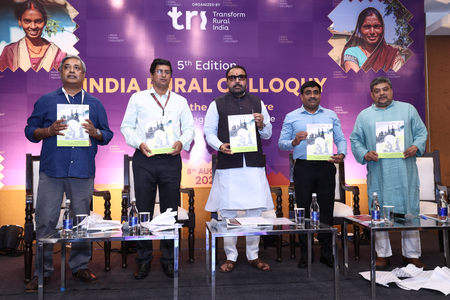
New Delhi, Aug 8 (IANS) Union Minister of State for Health Prataprao Jadhav on Friday called for collective action to put rural women at the centre of climate and health agendas.
His statement came as he launched a white paper by Transform Rural India (TRI) and the Development Intelligence Unit (DiU) at the fifth edition of the India Rural Colloquy in the national capital.
The white paper explores the impact of climate change on rural women’s health and well-being.
“We must foster the growth of neighbourhoods of care and villages where panchayats, ASHA workers and other frontline workers take the lead in building community health ecosystems,” Jadhav said.
“Let us work collectively to ensure that the government, citizens, society, health institutions, and the community place rural women at the heart of water, air, energy, and health initiatives. Only then can the vision of a ‘Viksit Bharat’ be fulfilled for every woman in every village,” he added.
Women comprise 73 per cent of the rural agricultural workforce but own less than 14 per cent of land holdings, limiting access to credit and enabling support.
The white paper showed that the burden of non-communicable diseases (NCDs) is also rising among rural women.
Only one in four women with hypertension receive care. In addition, crop failure and male migration have been linked to elevated levels of anxiety and depression.
Rural women are disproportionately affected by food shortages. Over half of rural women are anaemic and underweight, and the growing challenges of the climate crisis and its impact on the food production system will pose more challenges.
“We have attempted to weave together evidence, field realities, and policy reflections to bring visibility to the silent crises faced by millions of women navigating changing climates, fragile health systems, and structural inequalities,” TRI Associate Director Shyamal Santra said.
The white paper also suggested strengthening rural health infrastructure to ensure it remains operational during climate shocks, training frontline health workers in climate-sensitive care, and leveraging community-led initiatives.
It also called for redirecting Corporate Social Responsibility (CSR) and existing government programs and funds toward climate-health investments focused on rural women with a comprehensive, intersectional approach to address the emerging challenges and health issues.
Building a “Neighbourhood of Care” approach wherein localised, participatory eco-systems integrating health, nutrition, water access, and mental well-being are embedded within the local institutions and forums, leveraging family kinship and social networks, was also emphasised.
–IANS
rvt/vd



